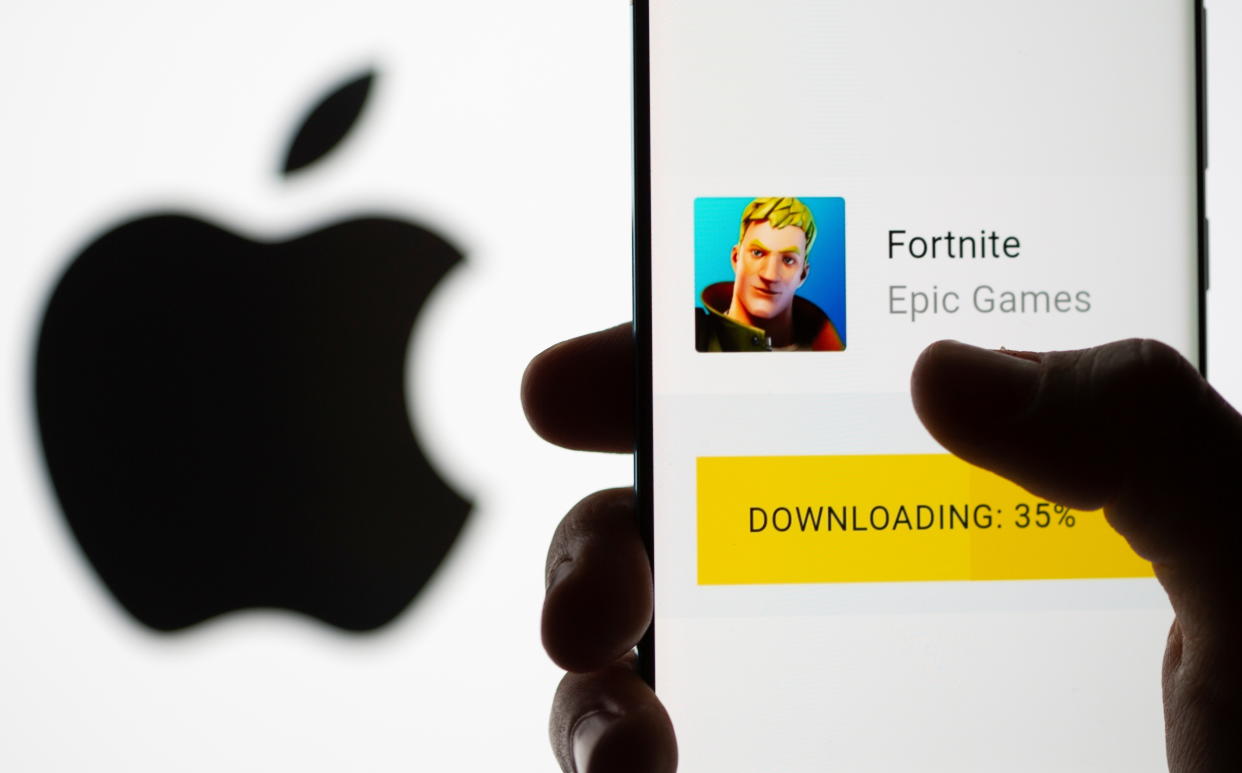Epic Games v. Apple: Tech giant to defend App Store in ‘high stakes game of poker’
Apple (AAPL) is set to defend its lucrative App Store in a federal court in California on Monday, as a trial is scheduled to get underway to hear antitrust claims waged by Fortnite developer, Epic Games.
The popular game with about 350 million registered players was booted from Apple’s and Google’s (GOOG, GOOGL) app stores in August, and banned from their operating systems, after Epic Games circumvented the platforms by offering direct, in-game purchases at a 20% discount.
Apple and Google both said the move violated their terms of service, justifying removal from the stores. Epic struck back by filing separate lawsuits against Google and Apple, claiming the removals were anti-competitive restraints and monopolistic practices that violate federal and California antitrust laws.
The Apple trial, which kicks off Monday and is expected to last three weeks, will be closely watched by regulators and app developers around the world, Wedbush analyst Dan Ives wrote in a note on Monday, which predicted that Apple will prevail.
“This is a high stakes game of poker being played as Apple needs to make sure the Epic challenge, which is very timely in light of antitrust swirls and growing opposition to Big Tech within the Beltway, does not create a ripple effect which developers and regulators globally are watching carefully,” Ives said.

Like its fellow tech giants Amazon (AMZN), Google, and Facebook (FB), Apple has faced growing antitrust scrutiny around the world. The U.K. has been probing Apple’s App Store rules, and late last month the Senate Judiciary Committee held a hearing scrutinizing both Apple’s and Google’s app store policies.
U.S. lawmakers previously attacked Apple in a House Antitrust Report on Big Tech claiming the tech giant wielded the App Store to punish competitors and “generate supra-normal profits.”
In his note, Ives emphasized that the App Store is a key part of Apple’s lucrative services business. Ives estimated that the services business alone has a $1.3 trillion valuation. At the time Apple removed Fortnite from its store, the app had been downloaded on iOS more than 250 million times.
Epic claims Apple used anti-competitive tactics in the mobile app software distribution market and in the market for processing consumer payments, specifically calling out Apple’s 30% commission fee on the sale of every app and in-app purchase as illegal.
Apple counters that Epic’s lawsuit is an attempt by a multibillion-dollar enterprise to hitch a free ride off of the ecosystem Apple has been building since it launched the app store in 2008. In one of its court filings, Apple said its 30% rate is justified compensation for access to its customer base, technology, security, vetting of store content, and customer service. Apple said Epic “simply wants to pay nothing for the tremendous value it derives from the App Store.”
“[B]y all accounts, Epic has taken advantage of Apple’s support and services more than any other app developer for the past two years,” Apple wrote.
Can Epic win its case?
In order to win its case, Epic will need to prove that Apple’s fees harm consumers, generally, rather than simply harm Epic itself. The game maker will also need to show that a competitive harm exists, beyond negative impact on its own revenues.
And because Epic offered direct purchases through its own platform, where it charges developers a 12% fee, it will need to convince a judge that its fee is different from Apple’s 30% commission.
Both Apple and Google have taken some moves to forestall criticism of their app store fees. For smaller developers with less than $1 million in app store sales, Apple began offering a reduced 15% fee structure, starting in January 2020. Google followed suit with a reduced fee program that begins July 1.
Rather than seeking monetary compensation, Epic is asking Oakland Judge Yvonne Gonzalez Roger to force Apple to again carry its software products. In addition, Epic says the court should require Apple to carry other app stores and payment processors on its devices.
In August, Judge Rogers denied Epic’s request for Apple to allow it back into the App Store while the case is pending. However, Rogers did grant Epic's request to prevent Apple from banning Epic’s Unreal Engine code, developer tools that it licenses to other game developers.
Apple also filed a counterclaim against Epic for breach of contract and fair dealing, alleging the game maker intentionally violated the terms of its licensing and developer agreements as part of an orchestrated strategy to avoid paying Apple commissions.
In the separate case against Google, Epic accuses the company of using illegal anti-competitive tactics in the market for the distribution of mobile apps to Android users, and the market for processing payments for digital content within Android mobile apps.
In an April 1 court filing, the court noted that trial is likely to be scheduled for April 2022.
Alexis Keenan is a legal reporter for Yahoo Finance and former litigation attorney. Follow Alexis Keenan on Twitter @alexiskweed.
Follow Yahoo Finance on Twitter, Facebook, Instagram, Flipboard, LinkedIn,YouTube, and reddit.
